Caduceus vs. Rod of Asclepius
When you want an icon that refers to medicine, use the rod with one snake, called the Rod of Asclepius. For commerce (and some other things, see below) use the winged staff with two snakes, called the Caduceus. These two symbols have very different meanings!
The Rod of Asclepius (displayed to the left) is the symbol for the Greco-Roman god Asclepius, known for his connection with medicine. It is a rod with one snake. The symbol is used today to represent the medical profession. You can commonly find this symbol on ambulances and everywhere medical symbols or logos are needed.
The Caduceus (displayed to the right) is the symbol for the Greco-Roman god Hermes or Mercury. It is a staff with two snakes and wings. Hermes is known for being a messenger of the gods, protector of merchants, guide to the dead, shepherds, gamblers, liars, and thieves. The Caduceus is generally used today as a symbol of commerce.
Why is there confusion in the U.S.?
In 1902 the US Army Medical Corp chose the Caduceus as their insignia. Most scholars regard this as a flat-out mistake. The US Army writes that the Caduceus “symbolizes the non-combatant role of the AMEDD”, which is to say they fully admit they are not using it as a medical symbol.
Here is the full text, retrieved from the US Army website on 12-10-24 (and on their 2011-2021 site):
Why does the Army Medical Department use the Caduceus, which represents the Greek god Hermes and the Roman god Mercury, instead of the Staff of Asclepius, the Greek god of healing?
The Army Medical Department uses both the Caduceus (Mercury’s/Hermes’ Staff) and the Staff of Asclepius as symbols for the Army Medical Department (AMEDD). The Staff of Asclepius, or Aesculapius, symbolizes the medical mission of the AMEDD, and is included on the AMEDD Regimental Crest (the staff with one snake entwined around it). The Caduceus, two snakes around a winged staff, symbolizes the non-combatant role of the AMEDD. The Caduceus was first used on enlisted men`s uniforms in 1851, over a decade before the establishment of the Red Cross as a symbol of non-combatants. In 1902 the Caduceus was chosen to replace the Maltese Cross insignia on Medical Corps officers` collars. In 1907, the Army Nurse Corps – the only other officer corps in the AMEDD at that time – began wearing a Caduceus with the letters ANC superimposed over it. Since that time, all new officer corps have been represented by a Caduceus specific to their corps, worn on the collars of their officers. After the First World War, many medical professionals left the army and returned to civilian practice. When they did, they took with them the Caducei they had worn proudly as members of the Army Medical Department. Over time, the Caduceus became associated with medicine in America, even in medical practices that had no association with the Army. Originally, though, the Caduceus did not stand for medicine, but represented the non-combatant status of military medicine on the battlefield.
The Encyclopedia Britannica notes, “Among the ancient Greeks and Romans [the Caduceus] became the badge of heralds and ambassadors, signifying their inviolability.” So maybe the US Army was thinking the symbol would convey a sense of “… Hey, hey, hey, don’t kill me, I’m just a messenger delivering the wounded to the hospital!” or some such. That is quite a stretch; I think somebody just used the wrong symbol. Today, military ambulances use the red cross and and civilian ambulances use the Star of Life, which prominently features, you guessed it, the Rod of Asclepius.
So why shouldn’t a medical provider use the Caduceus? Oh, let me count the ways! Being the symbol of Hermes, at best, it implies the medical professional is either selling or delivering something. The closest you’ll ever get to it being the right symbol is for a palliative care setting where medical professionals carefully “transport” those in their care into the afterlife. It goes downhill from there; it may imply the medical provider will kill you (Hermes is the guide to the dead!), feed you to the dogs (shepherds!), hock your jewelry (gamblers!), and tell your mom they haven’t seen you in a week (liars and thieves!). It is generally not a reassuring medical symbol. If you are a medical provider, please do not use the Caduceus!
- The Rod of Asclepius, a medical symbol
- The Caduceus, a commerce symbol
- The Star of Life, a medical symbol
- The US Army Medical Corps Insignia
- Rod of Asclepius 2018 redesign by the United Nations
Academic research on the subject is very clear. The Caduceus is not a medical symbol, the Rod of Asclepius is.  The best research can be found in the 1992 book The Golden Wand of Medicine a History of the Caduceus Symbol in Medicine by Walter Friedlander
The best research can be found in the 1992 book The Golden Wand of Medicine a History of the Caduceus Symbol in Medicine by Walter Friedlander
Dr. Friedlander spends 181 pages meticulously reviewing the history of the two symbols from their origins to the present day. It is very well researched, with lengthy bibliographies. He nails down with all the certainty that can be mustered by the best academician that the Caduceus is the wrong symbol to represent medicine. Read the final sentences of the book read (bold is mine):
It seems most likely that the caduceus became associated with medicine because of two errors: confusion of Traditional Hermes with other Hermes, and lack of recognizing or knowing the difference between two distinct serpentine objects, Traditional Hermes’ caduceus and Aesculapius’ staff. The result is that present day medicine, particularly in the United States, often shares the same symbol with merchants and commerce. Although, unfortunately, many lay people may think this is appropriate, it seems unlikely that most medical people, if they understood the underlying meaning of this object, would find it suitable. – page 158
Here are some scans of the first page and the concluding pages of The Golden Wand of Medicine.
There are a plethora of other resources I welcome you to explore. They all say the same thing. “Use the rod of Asclepius as the medical symbol”. Here’s a few articles from highly regarded sources to get you started:
- Finn, R., Orlans,D. A., Davenport, G. (1999). A much misunderstood caduceus and the case for an aesculapion. The Lancet, 353 (9168), 1978. http://dx.doi.org/10.1016/S0140-6736(05)77199-3
- Wilcox, R. A., & Whitham, E. M. (2003). The Symbol of Modern Medicine: Why One Snake Is More Than Two. Annals Of Internal Medicine, 138(8), 673. http://www.ncbi.nlm.nih.gov/pubmed/12693891
- Things you don’t learn in medical school: Caduceus http://www.ncbi.nlm.nih.gov/pmc/articles/PMC4439707/
- Wikipedia has a trove of well referenced info about the subject: Caduceus as a symbol of medicine, Caduceus, Rod of Asclepius, pictures of Ambulances, etc…
- Realizing the mistake, Monmouth University Nursing School removes the Caduceus from their logo in 2018
- Encyclopedia Britannica entries for Caduceus, Hermes, the Rod of Asclepius, and Asclepius.
————————————————–
Here is the full text from the US Army Medical Department Office of Medical History Frequently Asked Questions page, retrieved 10-31-20: (bold is mine)
Why does the Army Medical Department use the Caduceus, which represents the Greek god Hermes and the Roman god Mercury, instead of the Staff of Asclepius, the Greek god of healing?
The Army Medical Department uses both the Caduceus (Mercury’s/Hermes’ Staff) and the Staff of Asclepius as symbols for the Army Medical Department (AMEDD). The Staff of Asclepius, or Aesculapius, symbolizes the medical mission of the AMEDD, and is included on the AMEDD Regimental Crest (the staff with one snake entwined around it). The Caduceus, two snakes around a winged staff, symbolizes the non-combatant role of the AMEDD. The Caduceus was first used on enlisted men’s uniforms in 1851, over a decade before the establishment of the Red Cross as a symbol of non-combatants. In 1902 the Caduceus was chosen to replace the Maltese Cross insignia on Medical Corps officers’ collars. In 1907, the Army Nurse Corps – the only other officer corps in the AMEDD at that time – began wearing a Caduceus with the letters ANC superimposed over it. Since that time, all new officer corps have been represented by a Caduceus specific to their corps, worn on the collars of their officers. After the First World War, many medical professionals left the army and returned to civilian practice. When they did, they took with them the Caducei they had worn proudly as members of the Army Medical Department. Over time, the Caduceus became associated with medicine in America, even in medical practices that had no association with the Army. Originally, though, the Caduceus did not stand for medicine, but represented the non-combatant status of military medicine on the battlefield.
————————————————–
Notes:
“Asclepius” is also spelled Asclepios or (Latin) Aesculapius
The Rod of Asclepius image above was created by David Khai, distributed by The Noun Project. The fine folks at the Noun Project were a great help when I brought this issue to them, fixing hundreds of their catalog listings appropriately! Thank you!



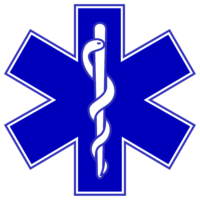
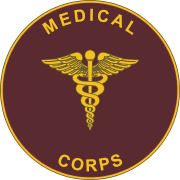

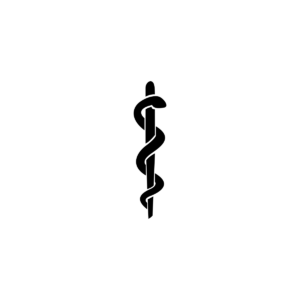
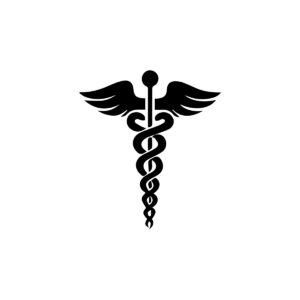
The Google Search for “medical symbol” prominently shows the wrong symbol. Similar Google Image searches also do. This is especially irksome since, while the page shows lots of Caduceuses every reference talks about why the Caduceus is the wrong symbol!
I sent Google feedback:
Hopefully they’ll find a fix
I wrote to the NounProject (a huge repository of icons)
I’m in communication with Erika at the Noun Project! We are fixing all of their erroneous submissions! I’m over the moon about this! They had some 200 mislabeled icons.
I submitted fixes for all of these tags and Erika at Noun Project committed them :-)
https://thenounproject.com/search/?q=Asclepius
Aesculapius
Caduceus
Bowl+of+Hygieia
Star+of+Life
pharmacy
medical sign
medical symbol
I also made a Wikipedia update, noting the correct place for the caduceus.
In this NPR article titled, Can You Guess The Meaning Of These Humanitarian Icons? they talk about how, in 2018, the iconographers at UNOCHA, part of the United Nations, “released a redesigned set of 295 icons… The 2012 iconography depicted the wrong snake in a symbol for health, for example. “We erroneously used the ‘Caduceus,’ a symbol of commerce, instead of the ‘Rod of Asclepius,’ the actual symbol of medicine,” says Paolo Palmero, an information management officer at the U.N. who helped work on the project.”
A win! After writing to the folks at http://www.publicconsultinggroup.com, they fixed some iconography on their website. They had been using the Caduceus as a medical symbol. :-)
Sent a letter to Crest Toothpaste today via https://crest.com/en-us/contact-us
P&G ref#:15771655
I’m reaching out to the authors of sites where the image of the Caduceus is misinterpreted as the Rod of Asclepius. First up is Firstclassmed. A Caduceus on this page is (incorrectly) the #1 image for “medical symbol” on Google.
I wrote to Jotform.com:
(see my query on their site)
I see that Jotform uses the wrong medical symbol in many places. For example, on your HIPAA Homepage and on the Patient Surveys that I receive from my ophthalmologist, West Coast Retina. This is a problem that erodes confidence in your brand!
The symbol I see on those pages is a staff with wings and two snakes coiled around it. That symbol is called the Caduceus and it is the symbol for the Greek god Hermes; it is used today as a symbol of commerce and messengers, and a few other purposes including shepherds, the dead, liars, gamblers, and thieves.
Instead, you almost definitely should be using a symbol with one snake wrapped around a rod, known as the Rod of Asclepius. Asclepius is a Greek god of medicine and the symbol is known today as representing medicine.
Here is a pointer to a website that can direct you to many resources verifying my claim. https://www.lee.org/blog/2016/06/15/caduceus-vs-rod-of-asclepius/
I would love to get a response, saying you’re looking into the matter. I’m sure that making this small iconographic change will be beneficial to your brand!
Best regards,
Lee Sonko

I sent a comment sent to the people at mentalitch.com
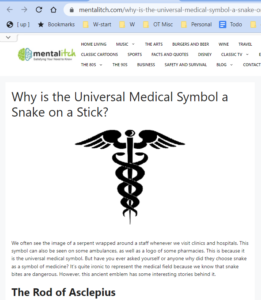
You have an article “Why is the Universal Medical Symbol a Snake on a Stick?” (https://mentalitch.com/why-is-the-universal-medical-symbol-a-snake-on-a-stick/)
The thesis of your article is that the caduceus is not the symbol for medicine but people erroneously use it as such. But your article uses it erroneously! Could you please replace the caduceus that is so prominently displayed at the top of the article with the correct image, that of the rod of Asclepius? You could put the caduceus further down the article as a reference.
When googling for “medical symbol”, the image for your article comes up very near the top, which perpetuates the confusion :-/ !
I’m crusading to fix this issue. If we all follow our own advice, we can do it!
I’ve got an article about this issue here that you can reference https://www.lee.org/blog/2016/06/15/caduceus-vs-rod-of-asclepius/
Thank you,
Lee Sonko
11-21-22 Update: They fixed it!! Yay!
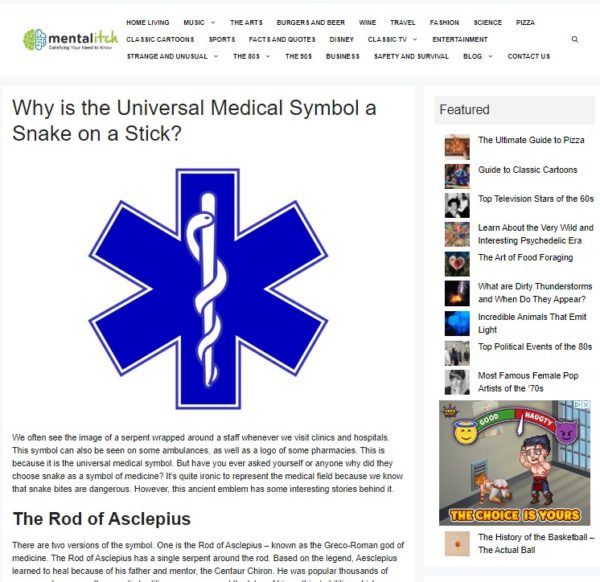
Sent a tweet to the author of this otherwise fine article about Asclepius and Caduceus
I commented on this article
Your image of the Caduceus appears prominently in a google search for “medical symbol”, promoting the very myth you are trying to bust! Could you try reworking your article with better SEO (search engine optimization)? Maybe label your images, and/or put the rod of Asclepius first. Something to help get the symbols right. All the best. My article https://www.lee.org/blog/2016/06/15/caduceus-vs-rod-of-asclepius/
Left feedback from a google search for “medical symbol”
Heh, the Caduceus Medical Group uses a rod of Asclepius as their logo. And they wrote on their site sometime before 2011 about how the rod of Asclepius is the medical symbol.
I’ve taken to doing google searches and submitting feedback on bad results.
I searched for “medical symbol” and the first hit was a poorly researched pro-caduceus page so I left feedback:
The caduceus is not a medical symbol! The Rod of Asclepius is. This article perpetuates an inaccuracy about the caduceus. Every other article one would google about medical symbols will prove my point. Here is one site that points to many citations confirming this: https://www.lee.org/blog/2016/06/15/caduceus-vs-rod-of-asclepius/
I wrote to Jotform again:
(see my query on their site)
Could you please change the “medical” symbol on your website, and templates? You consistently use the wrong symbol and it’s a bit insulting.
You use a staff with wings and 2 snakes, called the Caduceus. But the correct symbol would be with a staff and 1 snake, called the Rod of Asclepius. Here’s a good starting point:
https://en.wikipedia.org/wiki/Caduceus_as_a_symbol_of_medicine
https://en.wikipedia.org/wiki/Rod_of_Asclepius
For example:
https://www.jotform.com/pricing/
At the bottom of every HIPAA compliant templates forms you send out
https://www.jotform.com/form-templates/hipaa-waiver-form
https://www.jotform.com/form-templates/hipaa-authorization-form
Email to privacy@talktoivy.com
Hello Ivy Privacy Team,
I just used your service for the first time. It was quite seamless, thank you!
I noticed that you use the wrong “medical” symbol on your site next to the “HIPAA GUARD” words (see image below). If you knew the meaning behind the symbol, you’d be appalled that it was on your site!
To quote the preeminent text on the subject, The Golden Wand of Medicine – A History of the Caduceus Symbol in Medicine, “it seems unlikely that most medical people, if they understood the underlying meaning of this object, would find it suitable”
You use a staff with wings and 2 snakes, called the Caduceus. The correct symbol is a staff and 1 snake, called the Rod of Asclepius. The difference in meaning between the symbols is startling!
Look it up yourself:
https://en.wikipedia.org/wiki/Caduceus_as_a_symbol_of_medicine
https://en.wikipedia.org/wiki/Rod_of_Asclepius
https://www.lee.org/blog/2016/06/15/caduceus-vs-rod-of-asclepius/
Please change the symbol you use to represent medical issues.
Thank you!
Lee Sonko
————————————————–
Followup: Not seeing a change on their website. For example, here I wrote to them again April, 2022. The response, “I’ve taken care of passing along this feedback to my product team for you…”
Now if you google “medical symbol” this article comes up first.
I wrote feedback to Google about the page:
A google search for “medical symbol” turns up images of mostly the caduceus. I wrote feedback to google
“The images Google displays for “medical symbol” are mostly incorrect. The correct symbol is 1 snake on a staff, not 2 snakes with wings on a staff. This is verified by nearly every google search result, the text behind nearly every image, and all academic research. Google is finding results about the confusion related to the two symbols and choosing the wrong symbol to show.”
I spoke with the Helpdesk for Powerschool, an education portal for teachers and families. They had been using the wrong symbol to note students with medical concerns. A few months later, they updated the imagery! Hurray!
old :-(

new! :-)

If you do a google search for “medical symbol”, this article comes up first, presumably because it’s from a peer reviewed journal: Medical Symbols: The Caduceus. I spoke to and got an address to write to the publishing company, Elsevier, petitioning to remove this incorrect and detrimental article. We’ll see what happens!
————————————————–
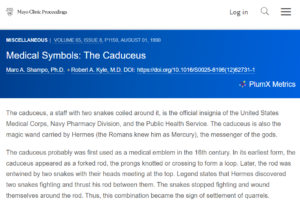
To: Researcher Support <support@elsevier.com>
To K. Cuestas, Researcher Support,
This is a comment regarding the following article:
– Article Title: Medical Symbols: The Caduceus
– Volume/Issue: VOLUME 65, ISSUE 8, P1159, AUGUST 01, 1990
– Journal Name where the paper was submitted: Mayo Clinic Proceedings
– You can find it online here and here.
Summary: This article promotes the incorrect belief that The Caduceus is the most appropriate medical symbol. The article should be removed from the public record and/or annotated to give context about its inaccuracies.
This article is often cited as being proof that The Caduceus is the most appropriate symbol to represent “medicine” in western culture. A google search for “medical symbol” turns this article up as the first result.
There are other articles in the series, “Medical Symbols: The Ankh“, “Medical Symbols: Shou“, and “Medical Symbols: The Staff of Aesculapius” . But the Caduceus article is the only one not behind a paywall. This gives the article an incorrect and unfair advantage in the theater of ideas.
Unfortunately, the piece is poorly researched and bereft of citations. For example, the second paragraph opens “The caduceus probably was first used as a medical emblem in the 16th century”. In fact, at that time it was used as the print mark for a publisher that published medical books as well as other books; in proceeding centuries, confusion between “publishing” (which is an excellent use of the Caduceus), “medical publishing”, and “medicine” (which is a terrible use of the symbol!) occurred. There are numerous other factual errors and omissions in the article.
Here are some excellent resources describing why the Caduceus should not be confused with the correct western medical symbol, the Rod of Asclepius:
– My own page with several peer reviewed citations
– The 1992 book “The Golden Wand of Medicine – A History of the Caduceus Symbol in Medicine: by Walter J. Friedlander that meticulously reviews the history of the Caduceus and all the missteps that has led us to where we are.
– google search and google scholar search with hundreds of confirmations and no credible dissenting opinions found.
Please take action to remove this incorrect article from the public record.
Thank you,
Lee Sonko, MA OTR/L
I might be getting close to fixing the google result for “medical symbol”. Here’s the current page:

Once that Mayo Clinic Proceedings entry comes down, the magic algorithm might be convinced that the rod of Asclepius is the “medical symbol”. If not, I’ll just keep at it!
Email to Lana Mitchell, National Media contact at the Royal Flying Doctor Service of Australia about their logo, sent 8-9-22. No response as of 11-6-22:
Good day,
With great interest, I read the history of the RFDS logo on your website. I noticed that a winged staff with snakes “the caduceus” was added to the logo in 1945. It is written in the history that this is intended to represent “the traditional symbol of medicine.” Please know that the caduceus is not a traditional symbol of medicine! It stands for many things but when you find out what, I think you will want to remove it from your logo!
I created a well researched and cited article that talks all about this issue. I urge you to take a look.
https://www.lee.org/blog/2016/06/15/caduceus-vs-rod-of-asclepius/
If I had to point a finger at why so many organizations use the wrong symbol today, I’d say that the US Army chose the symbol, incorrectly, for their Medical Department in 1902, and those doctors returned with the symbol on their shirts after WWII.
I’m happy to talk more about the issue but the scholarship is clear. I welcome you to do your own looking. Try a google search for “medical symbol”, but be sure to actually read the articles that come up. There has been confusion about the two symbols but 9 out of 10 articles will report just as I have!
I hope you use this information to help create a new, better logo for your organization. I would love to hear back from you about this!
Best regards,

Lee Sonko, OTR/L
Gave feedback to Google about the Mayo Clinic Proceedings article being the first result. “This poorly researched article disagrees with EVERY other article and book on the subject including every google search for “medical symbol”. The Caduceus is not the historical medical symbol, it is the rod of Asclepius.”
I got in touch with Doctor Robert Kyle, one of the co-authors of the current first google result for “medical symbol”, posted on Mayo Clinic Proceedings that erroneously tauts the Caduceus as the medical symbol. He regretted to say that he had made some edits to the article but wasn’t the authority on the subject. His co-author, Marc A. Shampo, Ph.D. had been the authority but has passed away. Doctor Kyle wasn’t able to help change the article. I’ll go back to the people at the Mayo Clinic Proceedings and try to get a more even treatment for all the articles, ie. get the Caduceus put behind a paywall along with the articles they wrote about the Shou, the Ankh, and the Lamp of Knowledge.
I wrote to Medscape.com about their incorrect use of the Caduceus
————————————————–
Please change the icon you use for “Medical Podcasts” on this page and any other pages that use the Caduceus symbol in place of the Rod of Asclepius
https://www.medscape.com/public/medscapeapp
The Caduceus is a terrible stand-in for the Rod of Asclepius when a medical symbol is needed.
You can find extensive references for my claim here https://www.lee.org/blog/2016/06/15/caduceus-vs-rod-of-asclepius/ and by searching any database. Here’s a fine set of search terms: https://scholar.google.com/scholar?hl=en&as_sdt=0%2C5&q=Rod+of+Asclepius+Caduceus+medical+symbol&oq=
I’d love to get a response from you about this telling me you’ve forwarded it to the right folks.
Thank you in advance!
Jotform says they are working on changing their design.
“…We were already thinking about a design change for HIPAA accounts and forms. We’ll look into this as well :)”
I suggested to Google that their first hit for “medical symbol”, the Mayo Clinic Proceedings article is incorrect:
This is the first article that comes up when you google “medical symbol” and it names the Caduceus as “the” medical symbol but EVERY other source and every other search hit refutes this. Just google it, or use google scholar, or any other tool. This is an old, outdated, inaccurate article that quotes no sources. It likely is a first hit because of the high reputation of the site it is on but it should be removed as inaccurate.
I wrote to the AHA about their logo

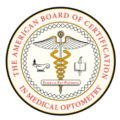
And the American Board of Certification in Medical Optometry
And the American Board of Optometry Specialties
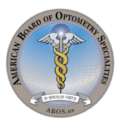
And The Florida Board of Optometry

And the California Optometric Association
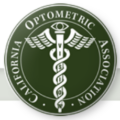
————————–
AHA,
I just wanted to point out that part of the logo for the American Hippotherapy Association uses symbology that you might not be intending. Your logo uses a staff with two snakes and wings. That is known as the Caduceus, it is a symbol for the Greco-Roman god Hermes/Mercury. Hermes is known for being a messenger of the gods and protector of merchants, among other things. The Caduceus is generally used today as a symbol of commerce.
The rod with one snake, the Rod of Asclepius represents the Greco-Roman god Asclepius. He was known for his connection with medicine. That symbol is used today to represent the medical profession.
There became confusion around these two symbols when in 1902 the US Army Medical Corp chose the Caduceus as their symbol. After World War I, when medical providers came home with that symbol on their clothing, it became misattributed as a medical symbol. The whole truth is more complicated than that, but not by much.
Any amount of research will show the rod of Asclepius to be a “medical” symbol and the Caduceus to carry many meanings, none of which are, I believe, what you are intending to portray on your logo.
You may want to look into this.
Here are some potential starting points for your own research:
– Google Scholar: https://scholar.google.com/scholar?q=medical+symbol
– The Golden Wand of Medicine: A History of the Caduceus Symbol in Medicine. A very well researched book on the subject:
https://www.lee.org/blog/wp-content/uploads/2016/06/The-Golden-Wand-of-Medicine-a-History-of-the-Caduceus-Symbol-in-Medicine-Friedlander-Walter-J-z-lib.org_.pdf
– My own page on the subject: https://www.lee.org/blog/2016/06/15/caduceus-vs-rod-of-asclepius/
Best regards,
Lee Sonko, OTR/L
I pinged support@elsevier.com again.
I’ve been trying for YEARS to get an article removed from the Mayo Clinic Proceedings website that claims the Caduceus is the medical symbol, offering incorrect reasoning and poor evidence. I’m just tired trying to get it fixed. I’ve got this long chain of pointless emails. I just tried calling Elsevier and they referred me to the Author Support team at 888-834-7287 option 2 but I’m too tired to call yet another time. Maybe I’ll do it later.